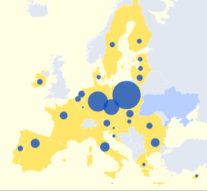
The European Commission’s 10-points Plan
Migration 23 October 2022Estimated time of reading: ~ 4 minutes
The European Commission’s 10-point Plan from March of this year, coordinates the welcoming of the Ukraine migrants as well as topics like energy, the economy, and sanctions on the Russian Federation that are occurring concurrently with the crisis in Ukraine. The European Council urged Member States to step up their efforts in a persistent spirit of unanimity and solidarity in its conclusions from the 24–25 March, and it requested the Commission to take the necessary steps to support such efforts. The 10-Point Plan was presented by French Presidency of the Council, represented by Minister Gérald Darmanin, and the Vice-President for Promoting our European Way of Life, Margaritis Schinas.
The 10-Point Plan calls for developing an EU platform for registration to exchange data on recipients of temporary protection and national protection statuses, supported by EU-LISA; establishing a coordinated EU level approach for transport and information hubs, supported by the European Union Agency for Asylum; and mapping reception capacity and accommodations to match the offers of those Member States that can assist those who need assistance. The Plan also urges the creation of national contingency plans to meet medium- to long-term demands. The Commission will assist Member States and create a coordinated European reaction and contingency plan.
The Plan further states that the Commission will create uniform guidelines and standard operating procedures with the European Union Agency for Asylum for the reception and support of children, as well as develop specific transfer procedures for unaccompanied minors and a shared anti-trafficking strategy to prevent trafficking and exploitation. Through increased transfers and the quick dispatch of Frontex staff to Moldova, the Plan strengthens solidarity with that country on a global scale. Transfers are a top priority right away, and they will be done in collaboration with the UNHCR and the IOM with money from the EU. Finally, it discusses how the conflict in Ukraine may have an impact on internal security.
The European Multidisciplinary Platform Against Criminal Threats (EMPACT) network and Europol will assist Member States in maintaining the highest level of vigilance against trafficking and organized crime organizations as well as in ensuring the application of EU sanctions against individuals in Russia and Belarus. The Commission will assist Member States’ efforts to cooperate through the bilateral deployment of police officers within the Prum framework.
The Plan’s final element addresses money and the economy. It needs sufficient budget and resources in order to offer detailed advice and tailored support to EU Member States. A one-stop shop has been developed to bring together all pertinent Commission specialists. The European Commission has suggested making the flexible use of money easier in order to complement the efforts of the Member States. However, it appears that migrants were denied the funds anticipated at the start of the crisis in this distribution of tickets (and money).
The majority of those monies are now going toward solving the energy situation and finding new sources of supply. For the umpteenth time, it has been demonstrated that Europe has fallen short in its attempts to address the migrant crisis, and recent conferences and talks on immigration, visa regulations, and additional sanctions against Russia only serve to reinforce this.
Written by: Nenad Stekić


